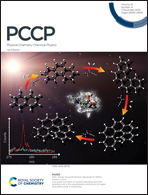From vibrational spectroscopy and quantum tunnelling to periodic band structures – a self-supervised, all-purpose neural network approach to general quantum problems†
Abstract
In this work, a feed-forward artificial neural network (FF-ANN) design capable of locating eigensolutions to Schrödinger's equation via self-supervised learning is outlined. Based on the input potential determining the nature of the quantum problem, the presented FF-ANN strategy identifies valid solutions solely by minimizing Schrödinger's equation encoded in a suitably designed global loss function. In addition to benchmark calculations of prototype systems with known analytical solutions, the outlined methodology was also applied to experimentally accessible quantum systems, such as the vibrational states of molecular hydrogen H2 and its isotopologues HD and D2 as well as the torsional tunnel splitting in the phenol molecule. It is shown that in conjunction with the use of SIREN activation functions a high accuracy in the energy eigenvalues and wavefunctions is achieved without the requirement to adjust the implementation to the vastly different range of input potentials, thereby even considering problems under periodic boundary conditions.

- This article is part of the themed collection: 2022 PCCP HOT Articles


 Please wait while we load your content...
Please wait while we load your content...